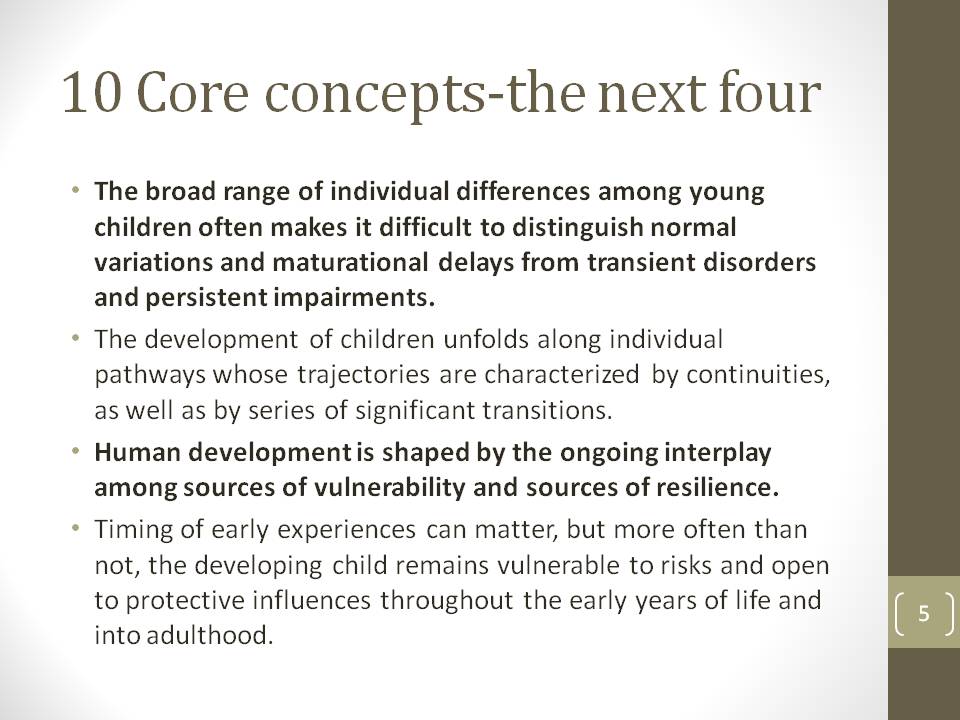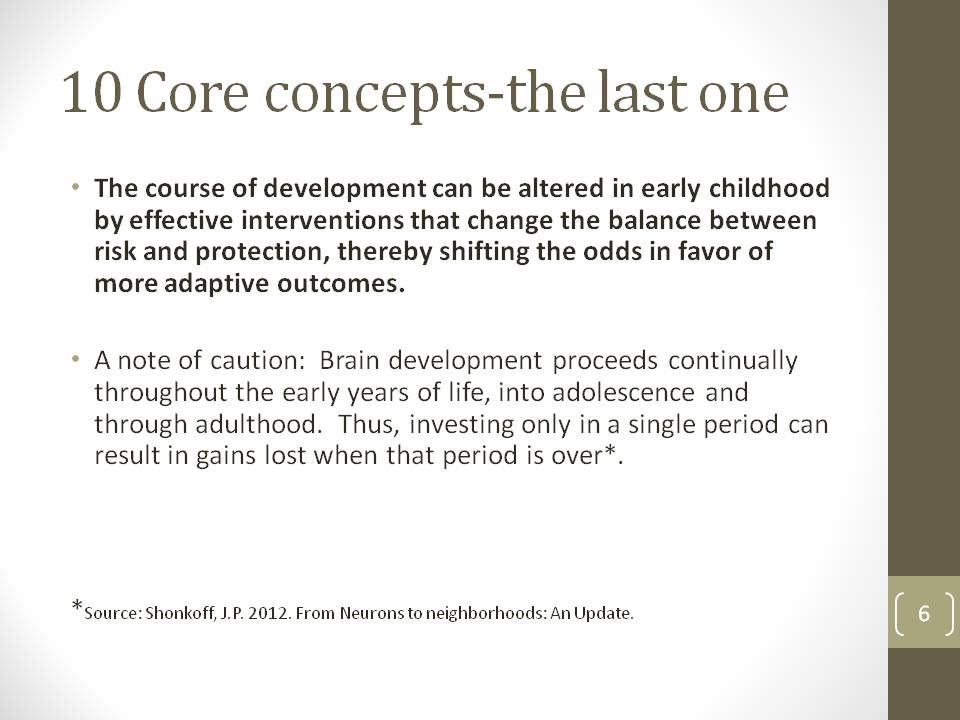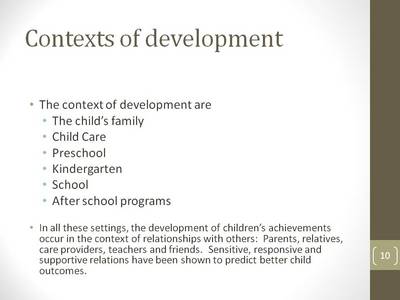Presented at the International Symposium on Children's Welfare and their Rights held by the Japanese Society of Child Science and
Child Research Net
Main Hall, Okayama Head Office of Benesse Corporation
October 14, 2013
The Welfare of children: Links and missing connections among science, conceptualization of rights and policy research
Introduction
The welfare of children depends on society's willingness to implement children's rights. Society's concepts of children's rights and what it takes to implement them depends on the intersection of at least three different sources of knowledge and ideals: (a) Scientific knowledge about the development of children and the conditions that promote healthy child development; (b) Conceptualizations of human rights; (c) Scientific knowledge about the efficacy of policies and practices that promote the well being of children. My presentation will discuss some aspects of the links and missing connections among these sources of knowledge and ideals.
I will first discuss what the science of child development tells us about children's development and well-being. I will mention the implications of such knowledge to children's rights. I will then present the UN Convention of the Rights of the Child, the extent to which there is scientific evidence to support some of the rights and how the same rights could be extended in light of scientific evidence. Finally, I will talk about ways in which scientists can help policy makers who wish to implement effective policies and practices that promote children's rights and well-being.
As you can see in this slide, I believe that there are relations of reciprocity between the different sources of knowledge and ideals. They can and should feed and enrich each other.
Scientific theory and evidence provide information about
The science of child development provides us with concepts about child development, with the tasks of child development and with the information about the context of child development.
The rights of children are guided by ethical/moral considerations and by evidence from scientific knowledge. Science provides the methods to sort out which ethical considerations regarding the rights of children successfully promote the well being of children and which may not. Moreover, scientific knowledge about the conditions that promote healthy child development can be used to generate new or more detailed rights of children.
Why should we rely on science when considering the welfare and the rights of children?
- Scientific knowledge is generated through research rather than opinion or political agenda.
- Scientific research tests hypotheses by using strict rules of evidence and rigorous peer review.
- Scientific hypotheses are educated guesses that are derived from but extend beyond the boundaries of established scientific knowledge. They suggest logical extensions of what is already known or take a leap based on what is already known. These hypotheses may be confirmed or disproved by scientific research.
- Science provides methods for evaluating the effectiveness of programs aimed at promoting child well being.
But scientific knowledge does not cover each and every topic that we may want to know about regarding children's rights. Therefore the business of science is never ending. When faced with issues or ethical imperatives for which there is no scientific evidence, we need to proceed based on our best judgment and call for research that will benefit others in the future.
Core concepts of child developments - the first five
It was not always understood that nature and nurture work hand in hand to produce the outcomes of child development. For many years scientists were debating about the primacy of either nature or nurture. The rights of children pertain to the nurturing of all children regardless of their potential. Nurture is the domain that we can bring under our control and use in order to do the best with the biological potential.
・The growth of self-regulation is the cornerstone of early childhood development that cuts across all domains of behavior.
This speaks to a universal of child development and suggests that it is the right of children to get all the support they need for developing their self-regulation skills.
・Children are active participants in their own development, reflecting the intrinsic human drive to explore and master one's environment.
This suggests that to achieve their potential, children need to be given an opportunity to explore and master their environment.
・Human relationships, and the effects of relationships on relationships, are the building blocks of healthy development.
This is also a universal. Child development occurs in the context of relationships with other people and includes learning about the creation and maintenance of healthy relationships.
・Culture influences every aspect of human development and is reflected in child rearing beliefs and practices designed to promote early adaptation.
This suggests that the rights of children must take into account cultural goals for the adaptation of children to their society. It is possible that different cultures may need to develop their own standards for the rights of children.
Core concepts of child development - the next four
 Enlarge
EnlargeThe first two bullets suggest that the rights of children should recognize individual differences among children and the importance of respecting such individual differences. The last two bullets suggest that it is the right of children to be supported by environments that minimize risks and promote resilience.
Core concepts of child development - the last one
 Enlarge
EnlargeThis core concept suggests that children should have a right to live in environments that minimize the risks of child development and that provide supports to resilience. Such environments should be available to children across all developmental periods. You cannot inoculate a child in the first year of life thinking that this will provide protection for the rest of the child's life.
In summary, The 10 core concepts of child development can provide guidance for the rights of children and for policies pertaining to child well-being.
Tasks of child development - 1. Self regulation
The science of child development provides information not only about the principles governing child development but also about the tasks of child development. These tasks are goals that children strive to reach and skills that they acquire with the assistance of parents and teachers. The acquisition of these skills occurs through a slow process that depends on the child's level of maturity and the supports in the child's environment.
A primary task of child development is negotiating the transition from external regulation by others such as parents and teachers to self-regulation, including learning to regulate one's Emotions, Behaviors, and Attention.
It should be the right of children to be provided the conditions that support the development of self-regulation.
Tasks of child development - 2. Communication and learning
Another important task that children strive to master is that of communication and learning.
This includes the early development of Language (comprehension and production), Reasoning (the process of thinking logically), Problem solving (surmounting barriers so as to reach a defined goal).
Here again, children should have the right to live in an environment that is supportive of the development of language, reasoning and problem solving skills.
Tasks of child development - 3. Forming friendships
Yet another focal task of child development is that of learning to relate well to other children and forming friendships.
This involves the emerging capacity to trust, to love and nurture, and to resolve conflict constructively.
This suggests that the rights of children should include the right to grow up in environments that support the development of the ability to trust, to love, to nurture and to resolve conflict constructively.
Contexts of development
 Enlarge
EnlargeThe science of child development has accumulated much evidence about the effects of the contexts in which children grow on their physical and psychological well-being. It has become evident that we cannot understand children's development without knowledge of the conditions of their development.
This scientific evidence has important implications for the rights of children. Children should have the right to grow up in contexts that promote their ability to grow physically and psychologically healthy and to achieve their intellectual potential.
Source of Information
You can read a lot of details about the points I made so far in "From Neurons to Neighborhoods: The Science of Early Childhood Development", a publication from the National Academy Press.
It represents the work of the Board of Children, Youth and Families of the National Research Council and Institute of Medicine.
Editors: Jack P. Shonkoff, MD and Deborah Phillips, Ph.D.
Published in the year 2000 and is still very current.
| | 1 | 2 | 3 | |



 Sarah L. Friedman, Ph.D.
Sarah L. Friedman, Ph.D.










